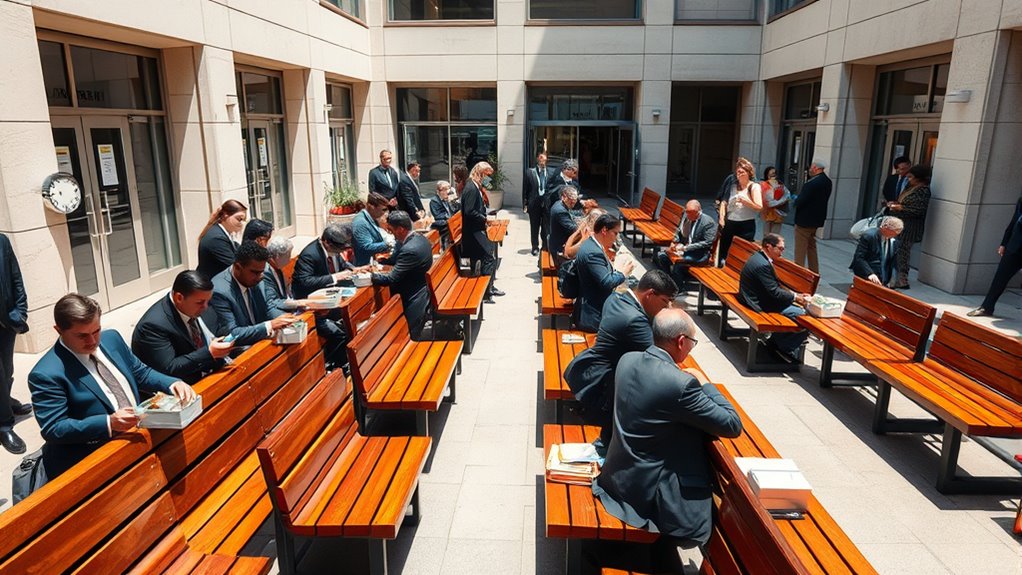To avoid missing lunch and getting caught at noon closures, check your government office’s specific break policies and schedules in advance. Many offices have set lunch hours or temporary closures for lunch breaks, so plan your tasks accordingly. Be aware of any notices or internal communications about closures, and consider timing your workload around those periods. If you’d like to know more about how to stay ahead of lunch closures and ensure smooth workflows, keep exploring the details.
Key Takeaways
- Know your state’s specific lunch break laws to avoid missing mandated meal periods or facing penalties.
- Federal law requires paid breaks under 20 minutes; unpaid meal breaks typically over 30 minutes if duties are relieved.
- Schedule breaks early in your shift to prevent being caught at noon closures or during mandated lunch periods.
- Employers must enforce break policies properly to ensure compliance and prevent legal issues or unpaid break disputes.
- Stay informed about employee rights and report any violations promptly to avoid missing your designated lunch time.

Government office lunch breaks vary depending on federal and state laws, but understanding your rights can be confusing. As an employee, you might wonder how your scheduled break fits into the rules, especially when it comes to break enforcement and employee scheduling. While federal law doesn’t mandate specific lunch periods, it does specify that breaks under 20 minutes must be paid, and longer breaks over 30 minutes can be unpaid if you’re relieved of duties during that time. But state laws often add more detail, requiring employers to provide breaks for employees working certain hours.
Government office lunch break rules vary; federal and state laws ensure proper scheduling and enforcement.
For example, in Delaware, if you work 7.5 hours or more, your employer must give you a 30-minute meal break. California law is similar, mandating a 30-minute break after five hours of work. New York requires a 30-minute meal break if you work more than five hours, unless your shift ends within six hours. Alabama follows federal guidelines, where meal breaks aren’t required but, if given, are unpaid if they last over 30 minutes. These state-specific laws highlight how employee scheduling and break enforcement can vary considerably depending on where you work.
Employers must ensure that these breaks are scheduled properly to comply with local laws and to promote employee well-being. If you’re a non-exempt employee—meaning you’re paid hourly—these laws apply directly, ensuring you get the breaks you’re entitled to. Conversely, exempt employees, typically earning over $23,000 annually, aren’t legally guaranteed breaks. That means your employer’s policies might differ if you’re in an exempt role, but in non-exempt positions, your employer must adhere to the applicable laws. Sometimes, there are industry-specific exemptions, like agriculture or domestic work, which might alter break requirements.
Failing to enforce proper break policies can lead to legal penalties, including fines and lawsuits. Employers who neglect break enforcement risk legal action from employees claiming denied or unpaid breaks, which can result in back pay and other penalties. That’s why proper employee scheduling is critical: it ensures breaks are scheduled and enforced correctly, reducing the risk of non-compliance. Good break enforcement not only keeps you within legal boundaries but also boosts productivity, health, and morale. Employees who receive regular breaks tend to perform better, feel more balanced, and experience less stress.
In addition, some states have specific rules about break enforcement that require employers to document and monitor break times to ensure compliance. Employees should also be aware of their rights to report violations without fear of retaliation, strengthening workplace fairness. Understanding your rights regarding government office lunch breaks helps you protect yourself and promotes fair treatment. Whether you’re working in a federal agency or a state-run department, knowing the specific laws in your jurisdiction can prevent you from getting caught at noon closures or unpaid break violations. Staying informed about employee scheduling and break enforcement ensures you get the rest you deserve and avoid legal complications that could disrupt your day.
Frequently Asked Questions
Are Lunch Hours the Same Across All Government Offices?
You might think lunch hours are the same everywhere, but lunch hour policies and office break schedules vary widely across government offices. Each agency sets its own rules, so break times can differ based on local regulations, office needs, and employee roles. Some offices offer flexible lunch hours, while others may close during specific times. Always check your specific office’s policies to avoid missing your break or being caught at noon closures.
Can I Access Government Office Services During Lunch Closures?
During lunch break periods, you usually can’t access government office services because of office closure notices and strict lunch break policies. Offices are closed, and staff are off duty, so in-person services aren’t available. Even if websites or phone lines stay open, walk-in access is restricted. To avoid inconvenience, always check the office hours and lunch break policies beforehand and plan your visit outside typical lunch closures.
Do Lunch Break Times Vary by Department or Location?
You’ll find that lunch break policies often vary by department and location due to operational needs and local regulations. Departmental schedules can differ, with some offering flexible or staggered breaks to maintain service coverage. Location-specific factors, like state laws or bargaining agreements, also influence break times. So, it’s smart to check your department’s policies or local rules to know exactly when you can take your lunch and avoid disruptions.
Are There Any Exceptions for Emergency or Urgent Visits?
Imagine a river that flows no matter if a bridge is closed or open. Similarly, emergency exceptions and urgent visits cut through office closures like lunch breaks, making certain care isn’t interrupted. Federal laws guarantee that in urgent or emergency situations, you won’t be turned away, even during scheduled closures. These protections ensure your health needs are met swiftly, regardless of office hours, safeguarding your well-being with unwavering legal currents.
How Can I Confirm a Government Office’S Lunch Schedule?
To confirm a government office’s lunch schedule, check their official website for a lunch announcement or break schedule posted under “Contact Us” or “About” sections. Call the agency directly to verify lunch hours or speak with someone in the administrative office. You can also review internal timekeeping systems or employee portals for official break schedules. Sometimes, social media pages or posted signage at the entrance provide updates on office lunch hours.
Conclusion
To make the most of your workday, it’s wise to be mindful of government office lunch hours. A little planning can help you avoid the midday lull and keep things running smoothly. Remember, sometimes the quiet moments are just a gentle reminder to pause and recharge. By staying aware of these breaks, you’ll navigate your day with ease, ensuring you’re never left in a pinch when those doors are temporarily closed.










